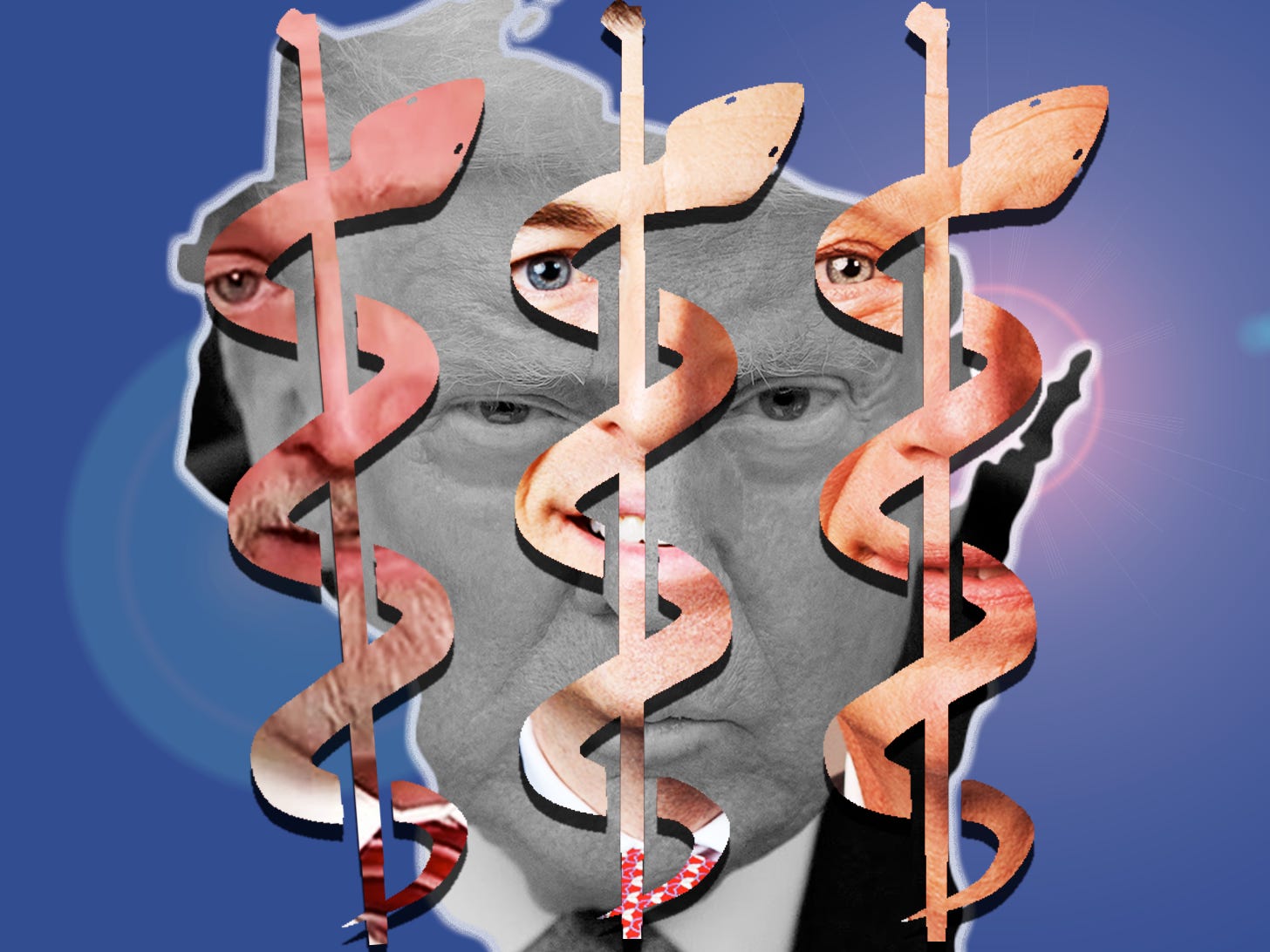Without Medicaid, Wisconsin won’t work. Any cut to the program puts us all at risk.
"The upcoming weeks...are ones of existential risk for American healthcare." Guest column from Timothy Faust.
The Recombobulation Area is a thirteen-time NINETEEN-TIME Milwaukee Press Club award-winning weekly opinion column and online publication founded by longtime Milwaukee journalist Dan Shafer. The Recombobulation Area is now part of Civic Media.
How — and whether — you or I wake up tomorrow is a matter of inches. It is a question of mundane terrors: a car accident, an unlucky fall, a bad cough; a thousand little things that have the ability to permanently reshape our lives. We are all Mr. Magoo bumbling through the set of Final Destination, always (and, for our own sanity, necessarily!) unaware of the millions of strokes of good fortune which keep us temporarily able-bodied or temporarily healthy. As healthcare writers Beatrice Adler-Bolton and Artie Vierkant put it: We’re not all sick, but none of us are well.
But time makes us all its prey. Eventually, for most of us, our luck runs out and we are hit by debility or disability. Within the structure of American healthcare, this misfortune precedes the threat of bankruptcy — the indignity of being compelled to choose between our money and our lives.
Medicaid, a government program which provides health insurance for people who don’t have a lot of money, is the guardrail which keeps us from being thrown overboard. This month, Congress will debate how and whether to strip the copper from its wires and hand over the proceeds to people with more money than God.
Republicans in Congress have committed to a budget that extends four trillion dollars in tax breaks, disproportionately concentrated among the wealthy — a tax cut for billionaires, more or less. To do so, they intend to hack away at government spending. The largest target is the Energy & Commerce (E&C) committee, which oversees Medicaid, Medicare, and several other programs. E&C was assigned $880 billion in cuts over the next ten years. While Medicaid wasn’t explicitly named in the budget resolution, this $880 billion target is impossible to achieve without at least $600 billion in Medicaid cuts, according to the government’s nonpartisan accounting agency, assuming all non-Medicare programs are otherwise eradicated.
The upcoming weeks, during which Congress and its committees will make their decisions about what happens to the budget, are ones of existential risk for American healthcare.
About 1.2 million Wisconsinites use Medicaid — a fifth of the state population. The largest group of them are children; about half a million Wisconsin children are on the program. Another 400,000 are adults, and another 40,000 are either foster children (up to age 26) or are eligible by pregnancy.
Eligibility thresholds vary from state to state. In Wisconsin, non-pregnant adults are only eligible if they make less than the federal poverty line (about $1,800 per month for a household of two). Children are eligible if their household’s income is less than three times the adult limit. While the majority of Medicaid recipients in Wisconsin are white, people of color are disproportionately represented in the program — an inevitable outcome of the systematic divestment and disenfranchisement of Black, brown, and Native communities across the state. These forces converge in Black health outcomes: the north side of Milwaukee has some of the worst infant mortality rates in the country.
The largest Medicaid program in Wisconsin is BadgerCare, but Medicaid is an umbrella with many programs, like IRIS (which provides services that let people with disabilities live at home or in the community instead of being warehoused in nursing homes) and the Birth to 3 Program (which funds comprehensive care for children with developmental disabilities). Medicaid is also the largest funder of mental health programs and a major funder of substance abuse rehabilitation programs.
This all makes good sense: we invest this money now to avoid dealing with worse outcomes later. That’s borne out in the polling: 75% of Americans like Medicaid; including a supermajority of Trump voters!
Last year, Wisconsin spent about $11 billion on Medicaid. About $6.6 billion of that came from the federal government. That’s the money Congress is trying to cut.
Generally speaking, healthcare costs — to be more specific, healthcare prices, which skyrocket every year totally unmoored from inflation or input cost — are too large to be borne by states alone. KFF estimates that an $880 billion cut to Medicaid would mean Wisconsin would need to find another billion dollars each year just to keep things where they’re at now.
That $11 billion isn’t set on fire or thrown into Lake Michigan (where, presumably, it might run ashore next to Deep Thought). Medicaid is a pillar of state and local economies. Half of rural hospitals operate in the red or near it; Medicaid’s disproportionate share hospital payments keep healthcare infrastructure standing in areas of the state otherwise emaciated by hospital systems reconstituting themselves to maximize profit.
There’s no way around it. Any cut to Medicaid will mean that people will lose their insurance, and facilities that depend upon Medicaid payments won’t be able to continue operating.
There is no accounting scheme on the table that won’t kick millions of people off their insurance. Republican representatives Bryan Steil, Derrick Van Orden, Scott Fitzgerald, Glenn Grothman, Tom Tiffany, and Tony Wied hold in their hands the power to determine whether our rural hospitals stay open or close; to force a million Wisconsinites to choose between getting essential healthcare and feeding their kids; to drive people with disabilities into nursing homes or onto the street.
Except for Ron Johnson, who came out and announced that Medicaid cuts are on the table, Wisconsin Republicans have been crafty; always certain to specify that they don’t want to cut Medicaid; certainly not for people who “deserve” (or, as Derrick Van Orden soberly phrased it, are “entitled to”) it. Their trick, then, will be to redefine who “deserves” healthcare in the first place.
Concepts of “deservingness,” typically associated with one’s ability to work, have defined every American public health or benefit program for hundreds of years. I find this notion morally repugnant, but it also is inadequate in the face of grotesque, bulging American healthcare prices. A quarter of Americans with employer-sponsored insurance can’t afford to use it, and a quarter of middle-class Americans have significant medical debt.
It seems likely that Republicans are going to attempt to impose work requirements on Medicaid spending — which Rep. Tom Tiffany has called for — which would compel Medicaid beneficiaries to prove their employment status (or some number of hours job hunting) each month in order to maintain enrollment.
Work requirements are, in a word, bullshit — almost everyone who receives Medicaid and can work is already working, whether at a job or as a caregiver, or is in school. Those who aren’t are typically dealing with adverse life circumstances, including healthcare problems, which prevent them from engaging with the traditional job market.
Medicaid is one of the most visible, touchable, real-world ways that the government shapes your life. It’s infrastructure. We think about government infrastructure as things like bridges and highways and water treatment facilities, stuff like that. But healthcare programs like Medicaid are the social infrastructure of America.
Enrolling in Medicaid can be an arduous process. There are a lot of forms, and unless you’re computer-savvy or have someone helping you, it can take a long time to get enrolled. Work requirements, compulsory burdens of red tape, are better thought of as penalties for losing your job — policies that subject people newly desperate to make rent to days or weeks each month finding and completing paperwork or navigating through phone trees.
In Arkansas, Medicaid work requirements were found to cost more to implement than they “saved” in cut benefits. The Urban Institute estimates that work requirements would kick 5 million Americans off Medicaid — largely for procedural or paperwork reasons — and lead to the loss of a half-million jobs.
Here’s what it comes down to, for me: Medicaid is one of the most visible, touchable, real-world ways that the government shapes your life. It’s infrastructure. We think about government infrastructure as things like bridges and highways and water treatment facilities, stuff like that. But healthcare programs like Medicaid are the social infrastructure of America. Whenever a pregnant mother working the double shift at a Dollar Tree gets a card that lets her go to the doctor to take care of her back pain — that’s Medicaid. Whenever a dairy farm worker gets an inhaler in the mail to treat their kid’s asthma — that’s Medicaid. Whenever a guy in a wheelchair can live with his girlfriend in their apartment instead of being warehoused in a nursing home — that’s Medicaid!
Any regular person is one degree removed from someone whose life was made better by Medicaid, and our world is made richer when the people we love are able to get the healthcare they need and lead the lives they deserve. An attack on Medicaid is an attack on society — the whole arrangement of people and resources that make our lives worth living.
Don’t get it twisted: in many ways Medicaid is inadequate for its function; too few people have it, too few physicians accept it, its payments to small providers may be too low, and its restrictions on disability healthcare are too stringent. Still, it is essential, and all of us deserve the little dignity Medicaid affords its beneficiaries — the fight is to improve and expand public healthcare programs, not roll them back.
Your typical right-winger likes to imagine that there’s some sort of secret benefit web that lets poor people live easy, comfortable lives; and that it’s being afforded to them at his expense, while he suffers away through the general slings and arrows of living in America.
This is incorrect — it’s hard as hell, being poor in America — but I can empathize with his frustration. It is impossible to deal with the American healthcare system, which apportions his permission to live freely in his own body based on whether someone can make a profit off it, and escape without the knowledge that someone is screwing him over. But the immigrant; the poor; the disabled — they are not by whom his freedom is curtailed.
Instead, I invite him to look at the stakes of the game being played with our votes – nearly a trillion dollars cut from healthcare and redistributed into the pockets of the super-rich; submission for the benefit of a bizarre and unknowable creature that would feed our liberty into a woodchipper if it juiced a few more points on the stock market.
Do we run into the arms of our subjugators? What country do we wish our children to inherit?
Timothy Faust is a healthcare writer and organizer with Citizen Action of Wisconsin. His work appears in Rolling Stone and VICE, and he has published one book on healthcare—”Health Justice Now” (Melville House). He lives in Milwaukee and is an increasingly melancholy Bucks fan.
Subscribe to The Recombobulation newsletter here and follow us on Facebook and Instagramat @ therecombobulationarea.
Already subscribe? Get a gift subscription for a friend.
Part of a group who might want to subscribe together? Get a group subscription for 30% off!
Follow Dan Shafer on Twitter at @DanRShafer and at BlueSky at @danshafer.bsky.social.







